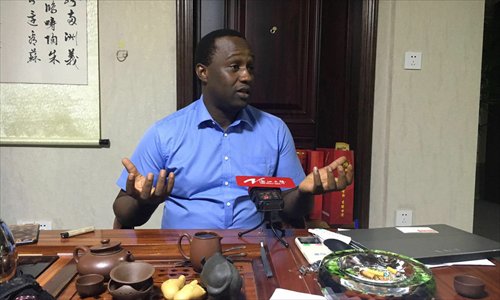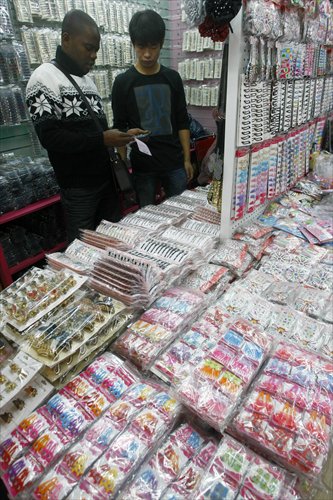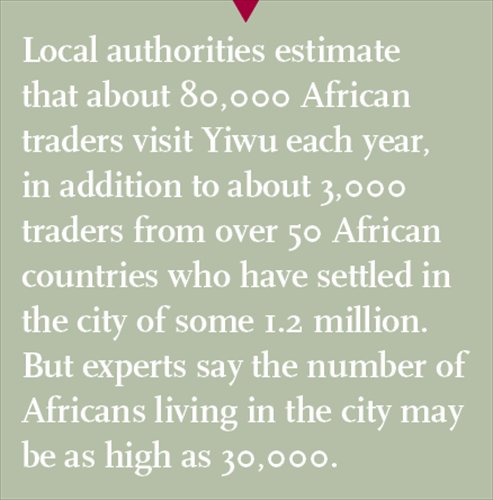As Guangzhou African community shrinks, other Chinese cities see growing numbers
Yiwu, home to the world's biggest wholesale market, is also becoming a hub for China-Africa trade as its African community thrives. Many African traders regard Yiwu as their second home, as they are given opportunities to participate in the city's affairs, enjoy a high level of religious freedom, and are treated with respect by law enforcement officers.

Senegalese businessman Sourakhata Tirera sits in his office in Yiwu. Photo: Zhang Yu/GT
Sitting in his office in Yiwu, East China's Zhejiang Province, Sourakhata Tirera, a Senegalese businessman, shifts easily between Chinese, French and his mother tongue Soninke to answer phone calls from his suppliers, partners and employees.
A successful businessman who has lived in the city since 2007, Tirera, known by locals as his Chinese name "Sula," is now a proud representative of the thriving African community in Yiwu.
The local government put up a poster with his face on it in the train station and on billboards alongside the city's main road, as a way to laud his entrepreneurial spirit but also to showcase the city's embrace of foreign traders.
While Guangzhou was the first Chinese city to receive large numbers of African traders and still boasts the country's biggest African community, experts say it is increasingly losing its leading position to Yiwu, which is becoming China's model international and multicultural trade city.
While recent reports show that the number of Africans in Guangzhou is gradually shrinking, Yiwu's African population is on the rise. "When [Africans] leave Guangzhou, some leave China but some go to other places in China, like Yiwu. Those that leave Guangzhou leave because, among other things, they want to find better opportunities in other parts of China and elsewhere," Adams Bodomo, Professor of African Studies at the University of Vienna and author of 2012 book Africans in China, told the Global Times.
The exact number of Africans living in Yiwu, which sits in the manufacturing hub of East China's Zhejiang Province, is hard to come by. Local authorities estimate that about 80,000 African traders visit Yiwu each year, in addition to about 3,000 traders from over 50 African countries who have settled in the city of some 1.2 million. But experts say the number of Africans living in the city may be as high as 30,000.
Yiwu is also playing a growing role in China-Africa trade. In 2015, Yiwu exported 48.21 billion yuan ($7.24 billion) of commodities to Africa, a 50.9 percent year-on-year increase.
Walking on Yiwu's streets, it's impossible to miss the African presence. In Yiwu International Trade City, Moroccan women wearing headscarves and robes bargain with local shop owners through the medium of calculators and broken English. Nigerian traders gather outside logistics companies as they pack bags of underwear into cartons which are about to be shipped. At night, businessmen from North Africa relax in the city's many halal restaurants, as they smoke hookah pipes after a day's work. And on Friday, the area near the mosque by the Yiwu river, one of the largest mosques in China, buzzes with Chinese Muslims and traders from North Africa and the Middle East, who flock to the mosque to pray.

Traders do business in a market in Yiwu, Zhejiang Province. Photo: IC
City of opportunities
Luo Lingjuan, a Yiwu-born businesswoman who now travels back and forth between Yiwu and South Africa to do business, says African traders started to arrive in Yiwu in 2001. That year, Yiwu started to build the International Trade City, a huge new market, in an effort to turn itself into a global trade hub for small commodities.
Spreading over 5 million square meters, the market today boasts 75,000 stalls selling over 1.8 million types of products. Walking around the market from floor to floor is an awe-inspiring experience - stalls are jam-packed with everything from rubber sandals to plastic flowers, stuffed animals to key chains, and it's easy to get lost in its labyrinth of shops and corridors without a guide.
Luo said Africans started to arrive in droves in around 2007 and have since been growing in numbers. "Compared with Chinese traders in Africa, African traders' language skills are much stronger and many of them master Chinese in a very short time," she told the Global Times,
Leo Nzeogwu (pseudonym), a Nigerian trader who moved from Guangzhou to Yiwu five years ago, said he moved here as he feels the city offers him more opportunities. "Yiwu has more goods now than Guangzhou, and in the market it's very easy to find what you want because of how it is designed. In Guangzhou there's no such market," he told the Global Times.
He currently runs a logistics company near the International Trade City, and has a Chinese wife and two children.
Tirera says more and more Africans are coming to Yiwu to do business.
Since 2007 when he first settled down in Yiwu, his business has grown from hiring only one translator to a company with 33 employees, and his office has expanded three times and currently covers three floors in a building near the International Trade City, shipping over 200 containers home each month, filled with hundreds of products such as garments, toys, accessories and electronic devices.

Solving disputes
Tirera looks like a successful businessman. He wore a nice blue shirt, has a tough build, and answers questions in Chinese fluently with a slight southern accent.
While Yiwu has certainly helped him make a lot of profit, Tirera says what makes him grateful to the city is how he can achieve things that aren't possible in his home country. In Yiwu, the municipal authorities regularly solicit him and other African businessmen for their opinions on the city. He even plays the role of a public servant - as the deputy director of Yiwu People's Mediation Committee for foreign-related disputes.
As one of 16 foreign mediators at the committee, Tirera visits the committee each month and helps solve the disputes between Chinese suppliers and foreign buyers. This gives Tirera a sense of belonging and participation in Yiwu's affairs.
Disputes are common in Yiwu. While previously, buyers and sellers could only try to reach an agreement through a translator, now the government is offering an international group of mediators to help traders solve their disputes.
"Most of these disputes stem from mistrust, and the local government invited us to become mediators because foreign traders tend to trust us, and also we can better understand their concerns," he told the Global Times.
Among the 16 mediators, six are from Africa. "We're not discriminated against or treated differently from other foreign communities like Arabs, white Americans or South Koreans," said Abakar Ahmat, a 36-year-old Chadian businessman who is also a member of the mediation committee.
The local government is also trying to prolong the length of visas. Last year, Tirera was among the first batch of foreign traders in Yiwu to obtain a two-year visa. Previously the maximum period of stay was one year.
Dealing with the authorities
The cost of living in China has been rising. Tirera says when he first came to China, the monthly salary of a Chinese employee was around 1,200 yuan. "Now, you need to pay at least 3,500, and all these additional costs will inevitably be added to the price of the commodities," he said.
Tirera says he is trying to induce Chinese manufacturers to build factories in Senegal and bring Chinese technology there. He thinks this is a win-win situation - Africa will learn from the technology, and Chinese can tap into Africa's low labor costs.
Some Africans have complained about increasing police passport checks as the city tightened its security measures in recent months, as Hangzhou, a city about one hour's drive away from Yiwu, is holding the G20 summit in September. M. S. Jimoh, a Ghanaian art trader who sells African antiques at the International Trade Center, said police harass him every day, asking for his passport.
To make things easier for the foreign traders living in the city, last month, Yiwu started to issue them "foreign citizen cards." The card is the city's own version of a resident identity card, except that it's designed especially for foreigners and can be used as a form of personal identification.
"Yiwu is doing everything it can - it isn't able to give us a national identity card, but it gives us this citizen card that no other Chinese city has," Tirera said proudly, pointing to the pouring rain outside. "You know in this weather, if I take my passport with me outside it could easily get wet. With the citizen card, I don't need to bring my passport."
Ma Enyu, research fellow at the Institute of African Studies, Zhejiang Normal University, said the way Yiwu treats foreigners is in part because of the city's role as a trade hub. "Commerce is the pillar of Yiwu, and the city's friendliness to foreign traders could be traced to its mercantile tradition," she told the Global Times.
Ma said the fact that most Africans in Yiwu are traders makes it easier for the Yiwu government to manage them. This is opposed to Guangzhou, where Africans come from diverse backgrounds and live in the city for different purposes, Ma said.
Newspaper headline: Opportunities abound